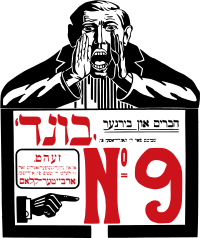General Jewish Labour Bund in Lithuania, Poland, and Russia
More languages
More actions
General Jewish Labour Bund in Lithuania, Poland and Russia אַלגעמײנער ייִדישער אַרבעטער־בונד אין ליטע, פּױלן און רוסלאַנד | |
|---|---|
 | |
| Founded | 7 October 1897 |
| Dissolved | 19 April 1921 |
| Merged into | Bolsheviks |
| Political orientation | Socialism Anti-Zionism |
The General Jewish Labour Bund in Lithuania, Poland, and Russia, often shortened to the Bund, was a socialist organization in the late Russian Empire. It considered itself the only representative of the Jewish proletariat.[1]
History[edit | edit source]
The Bund participated in the founding congress of the RSDLP in 1898 in Minsk.[2] It opposed Lenin at the second congress, where it had five out of 51 delegates, and most of its members left the party.[3]
The Bund adopted its national programme at its sixth congress in 1905.[1]
The Bund sent three delegates to the fourth congress of the RSDLP in 1906.[4]
Ideology[edit | edit source]
The Bund wanted to create a Diet (parliament) to preserve Jewish culture from Russian nationalism even though similar diets had failed to protect Poland and Finland from oppression.
The Bund favored Yiddish over the languages of other national minorities and gave preference to electors who promoted the use of Yiddish.[1] It wanted to divide members of the RSDLP by nationality.
References[edit | edit source]
- ↑ 1.0 1.1 1.2 Joseph Stalin (1913). Marxism and the National Question: 'The Bund, Its Nationalism, Its Separatism'. [MIA]
- ↑ Joseph Stalin (1939). History of the Communist Party of the Soviet Union (Bolsheviks): 'The Struggle for the Creation of a Social-Democratic Labour Party in Russia'. [MIA]
- ↑ Joseph Stalin (1939). History of the Communist Party of the Soviet Union (Bolsheviks): 'Formation of the Russian Social-Democratic Labour Party. Appearance of the Bolshevik and the Menshevik Groups within the Party'. [MIA]
- ↑ Joseph Stalin (1939). History of the Communist Party of the Soviet Union (Bolsheviks): 'The Mensheviks and the Bolsheviks in the Period of the Russo-Japanese War and the First Russian Revolution'. [MIA]
